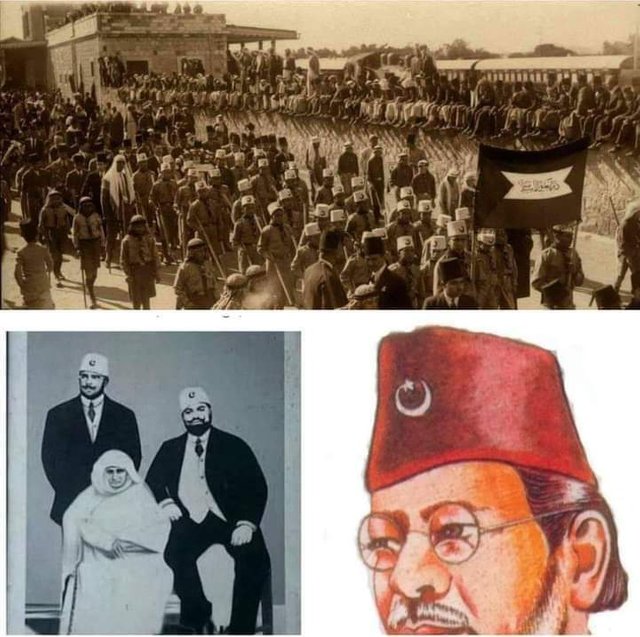Maulana Mohammad Ali Jauhar was born in 1878 in Rampur. His mother had to bear the responsibility of upbringing and education due to his father's shadow getting up from his head in childhood. According to the legend, his early education in Urdu and Persian took place at home. After this he did high school from Bareilly. He went to Aligarh for further studies and there he passed the BA examination.
Elder brother Shaukat Ali's wish was that Maulana Jauhar pass the ICS (Indian Civil Services) examination, for which he was sent to Oxford University, but Maulana failed there. After his return from London, the Maulana wanted him to serve as a Ustad in Aligarh, but his wish could not be fulfilled. Forced, he had to work as a higher education officer in Rampur. For a few days he also worked in the princely state of Baroda, but Maulana was created by God for some other work.
From the very beginning, he had a desire to choose journalism as his profession and serve the country through it. From 1910, he started bringing out an English newspaper Comrade from Calcutta. In 1912, when the British made Delhi their center, Maulana Jauhar also came to Delhi and from here he started taking out Urdu daily Hamdard from 1914. Both of these were famous newspapers of their time, whose example is rarely found even today.
The Tawheed is that God should say in laughter
This guy is angry with Do Alam for me,
Qatl-e-Hussain asl is Marg-e-Yazid
Islam survives after every Karbala.
This poetry of Maulana is only the result of those days when he was in jail. In his spare time, when all kinds of restrictions were imposed on him, but who can put restrictions on his heart and mind? So this collection of poetry is in front of us today. After coming out of jail, the political uproar and the responsibilities of journalism never allowed him to write poetry even for a moment. Some letters of Maulana have also been published in the form of literary literature, which he wrote to his friends and relatives. In this we get to see his literary glimpse. These letters reveal his personal life.
If we look at the political life of Maulana Mohammad Ali Jauhar, then his biggest feat in Indian history is the Khilafat Tehreek. This was the Tehreek, which was started in support of Turkish Muslims, but later it took the form of Indian freedom struggle.
This was the platform from where Mahatma Gandhi made his political debut. The Khilafat Tehreek brought Hindus and Muslims against the British. Both the sects started taking strong steps against the British with great enthusiasm and passion, so that India could be liberated. For this Maulana did all kinds of torture. He fought with the British for this till his death.
Maulana Mohammad Ali Jauhar writes at one place-
The British government once gave us this message that "if both of you brothers want freedom (on conditions), then the government is ready to release you." But I did not accept this release, nor did my brother Shaukat accept such a release which can be achieved by selling freedom, virtue and rights.
Maulana's health deteriorated due to constant going to jail. There were diabetic patients who fell ill due to lack of proper food in jail. When he came out of jail in 1930, he was very ill, despite that he went to attend the Round Table Conference in London for the independence of the country and said in his last speech
"Give freedom to my country or give me two yards of space for my grave, because here I have come to seek the freedom of my country."
At that time the British did not listen to him and after a few months, Maulana Jauhar Ali Sahab had died in London on the day of January 04, 1931.
This convoy belongs to the funeral of freedom fighter Maulan Muhammad Ali Jauhar in Palestine Jerusalem, who his loved ones took him from London to Jerusalem and handed over the same to him. Jerusalem was not a part of Israel then. The Mufti of Jerusalem, Aminul Husseini, offered prayers for Maulana's funeral.
We inherited the passion to love our country from our elders. To what degree did those people love their country that they laughed at the freedom laughing and swung to the gallows, but did not leave the feeling of love for their country. Fighting for him kept fighting with the British.
The war against the British was started by Ali Vardi Khan in 1754 and Nawab Seraj-ud-daula in 1757 and Tipu Sultan from 1783 to 1799.
The same was given to him in 1803 by Shah Abdul Aziz Mohaddis Dehlavi R. Under the shadow of the same tehreek, his disciples especially Syed Ahmad Shaheed Rae Bareli fought the war of independence, after that in 1857, through this tehreek, the second round of independence started in which Muslims from beginning to end fought. Along with playing the role, the countrymen were also involved in this war of independence, and in this way, the Tehreek which was started in 1754, finally, as a result of that, this country became independent in 1947.
From 1754 to 1947, there is a mussal tale of sacrifice, which our elders paid for with their own blood.
We just have to make sure that we do not let the blood of the elderly go to Raiga. However, this freedom has to be protected, this country has to be always kept in its chest.
yum e azaadi mubarak
India stays alive!
Writer:- BSK
SOURCE:- INTERNET
LOCATION:- JAIPUR
